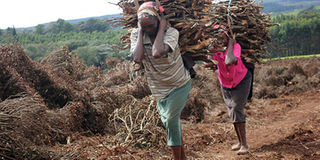It’s the strength of a woman that keeps the world moving

Women carrying firewood on their backs at a farm in Mau Tea Estate in Kericho County. Women walk for long distance to fetch firewood for cooking in their homes. More often than not, their work is devalued and yet they drive economies. PHOTO | POOL | NATION MEDIA GROUP
It is 2020, the start of a special decade globally. For the unconverted, this is a decisive decade for the 2030 Agenda. It is the decade of no turning back.
Between now and 2030, all eyes are on the Sustainable Development Goals (SDGs) full implementation.
During the just-ended Africa Regional Forum on Sustainable Development Goals (ARFSDG) in Victoria Falls, Zimbabwe, there were thundering echoes from leaders and government representatives, Kenya included, as commitments were signed to assure citizens of the timely implementation of all the 17 SDGs by 2030.
The Government of President Uhuru Kenyatta, decision-makers, policy-makers and other players in this country, will be held accountable if Kenya lurks behind in the implementation of SDGs.
We are not there yet, but there is hope.
GENDER EQUALITY
But truth be told, all is not doom and gloom; there is progress on the road to Gender Equality especially on the political front and in the labour market.
This is a journey that must be taken by all of us although we are well aware that this road is wrought with challenges. But we must make things work by being unafraid.
Women labour force in Kenya currently accounts for 48.71 per cent. This is a plus for Gender Equality.
Kenya, with all her problems, leads in Africa as one of the countries with a significant number of women holding managerial positions at 19.8 per cent. South Africa comes a close second at 17.4 per cent followed by Botswana at 16.9 per cent.
Kenya shines because of the strides made by Affirmative Action and women-friendly public sector policies that recognise women as a critical link to development.
COVID-19
The Constitution provides a one-third gender representation in State corporations and government. Such progressive legal frameworks strengthens women’s voices as we celebrate International Women’s Day.
Were it not for fears posed by COVID-19, women from all over the world would have assembled in New York City from March 9 to March 20, for the 64th Session of the Commission on the Status of Women (CSW) as planned to further amplify women voices.
However, the Commission could be forced to scale it down to a half-day meeting with only New York-based delegates in attendance.
Meanwhile, the battle to create an equal world continues. A study by FIDA in early 2018, shows that in spite of the fact that 32 per cent of Kenyan households are headed by women, only one per cent of women countrywide own land on their own while five per cent jointly own land with men.
Centuries of patriarchy has ensured that land ownership is skewed towards men. Throughout Kenya, women can only use land but they don’t own it. How sad!
MATRIMONIAL PROPERTY ACT
Seven years ago, Kenya passed the Matrimonial Property Act, which complimented other series of laws protecting women’s access to land and other property.
Unfortunately, the implementation landscape is discouraging. Archaic traditions and deep-rooted patriarchy compound its implementation, leaving women trapped and unable to progress to attain their dreams.
This trajectory should be sustained not left to whittle. It is one of the main development indicators to measure Gender Equality.
Pointedly, we need to invest more in human capital, and more so women; many of whom form the majority of workforce in the informal sector.
More often than not, their work is devalued and yet they drive economies. Women in all sectors should be recognised as critical economic actors whose contribution should not be ignored.
HARMFUL PRACTICES
If women stopped working just for a day at home, in the farms and elsewhere, the world would fall apart. It is the strength of a woman that pushes the world.
Where do we leave harmful practices? Women and girls are still being mutilated and forcefully married off. Globally, 200 million women and girls have been violated by being subjected to Female Genital Mutilation, Violence against Women and Gender-Based Violence. Due to legal frameworks that work against FGM, the vice has been on a remarkable decline from 40 per cent in 1998 to 27 per cent in 2008-09.
Generally, Kenya FGM statistics vary from one region to the other. However, North-Eastern has a worrying prevalence rate of 97 per cent.
GENERATION EQUALITY
President Uhuru has shown political will in ending FGM and has roped in First Lady Margret Kenyatta to beat the drums loud enough to exorcise the ghosts of FGM. Will he beat his 2022 FGM ban without real framework?
This year’s theme for the International Women’s Day (IWD) is: I am Generation Equality: Realising Women’s Rights. It resonates with Goal 5 of the SDGs which calls for Gender Equality in the world in all levels. It is a clarion call for Gender Equality.
The theme is perfectly aligned with UN Women’s objective of multigenerational campaign for GE. Efforts geared towards ending all forms of discrimination against women and girls is a basic right and a human right.
Going forward, business as usual cannot work; we have to think differently if Kenya is to beat the 2030 deadline.




